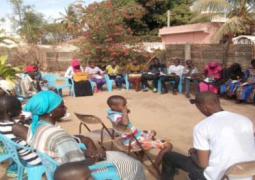The Director of Health Services at the Ministry of Health and Social Welfare, Dr. Bekai Camara, has said that pregnancy and childbirth continue to cause death and misery, as 529,000 maternal deaths annually occur worldwide.
Dr. Camara, who was speaking at the opening of a sensitisation for parliamentarians on partnership and advocacy on reproductive child health, said about 90% of these deaths occur in the sub-Saharan Africa and Asia, while West Africa's maternal mortality ratio vary from 110-200,000 per 100,000 live birth.
According to him, the objective of the forum was to share information on reproductive health policy and key strategies, with a view for greater involvement in its implementation towards accelerating the reduction of maternal newborn and childhood mortality and morbidities, thus contributing to achieving the MDGs 4 and 5.
At the country level, Dr. Camara noted, the trends in maternal, new born and child mortality had witnessed a significant decline, though the current levels remained unacceptably high, that is maternal mortality ratio decline from 1050/100,000 LB in 1990 to 556/100,000 LB in 2006.
Highlighting on some of their achievements for the past two years, Dr. Camara disclosed a series of training programmes for medical doctors, final year medical students, midwives, nurses, tutors and traditional birth attendants on emergency obstetric and new born care.
"In June 2008, The Gambia successfully hosted the Vision 2010 annual review of progress meeting with a view to assess the achievements made in the reduction of maternal and neonatal mortality in all the domains of the Vision 2010 logical framework for West and Central African countries," he stated.
Dr. Camara further pointed out that the recommendation that emanated from the meeting (Vision 2010) were the first ladies specific actions to be carried out. These recommendations, he went on, are mainly advocacy with Heads of State, members of their governments, as well as technical and financial partners for increased political will and financial support, among others.
For her part, Mrs. Ramou Cole-Ceesay, the Assistant Director of Family Health and Disease Control, stated that it is time to create a new paradigm shift not only planning and implementation, but also monitoring and evaluation.
"The weak link in most systems is the lack of synergy between the health professionals and wealth of knowledge and skills of the communities and constituencies that are so essential to successful intervention," she revealed.




